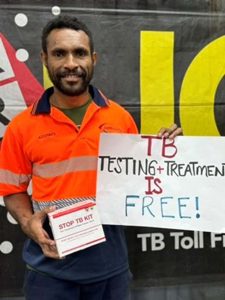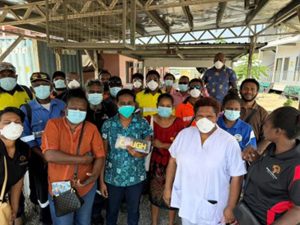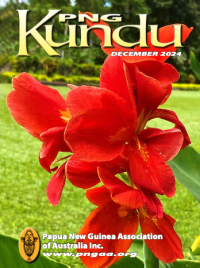Businesses for Health and the TB Crisis in Papua New Guinea

Our tiny Pawa Women team—Ann Clarke; Ops Manager, Lorrie Tapora; Nursing officers (L-R) Lowen Sihare and Sharlonica Lung missing is Health Extension Officer Teresa Koratsi. Our team’s office is hosted by G4S Security.
Dr Ann M Clarke
Executive Director, Businesses for Health: Tuberculosis & HIV
In the vibrant yet challenging landscapes of Papua New Guinea a health crisis persists, yet it is one that harks back to times most believed were long conquered. In PNG, Tuberculosis (TB), an ancient, lethal, hard-to-treat disease, will flourish in 2024. The current statistics paint a far grimmer picture than the era of pre-independence.
Long-time PNG residents and those with historical ties to PNG might remember Gemo Island, an islet in Port Moresby Harbour. In the early to mid-20th century, this island served as a quarantine station and home to the TB (and leprosy) isolation hospital. The isolation strategy was a common response to TB worldwide, aimed at curbing the spread of this highly infectious TB. By the 1970s, advancements in treatments and a deeper understanding of TB transmission allowed for the closure of Gemo. Patients could now be treated within their communities. This signalled a monumental shift in public health strategy and reduced stigma.
At independence in 1975, optimism was high; by 1980, PNG reported fewer than 10,000 new TB cases annually. Fast forward to 2024, and the narrative is dark. Numbers have increased each year and this year over 42,000 new and relapse cases and an estimated 5,000 deaths will be recorded. The complexity of these cases has escalated, with nearly five percent exhibiting drug-resistant strains, coupled with high rates of TB/HIV co-infections. This triple menace complicates awareness, treatment and prevention strategies significantly.
Perhaps the most heart-wrenching statistic is that children constitute 26% of the national TB caseload. This is the highest proportion globally. This figure is not just a statistic but a reflection of the vulnerability amongst poorly nourished children, low rates of childhood immunisations, overcrowding and the dire state of health infrastructure.
Recognising the escalating crisis, the National Department of Health, led by then Deputy Secretary Dr Paison Dakulala in 2017, issued a compelling call to arms to the business community. This call led to the birth of the Businesses for Health: TB and HIV project (B4H), a pioneering initiative aimed at mobilising resources, expertise and awareness to tackle this complex health problem head-on from the perspective of the private sector.
B4H has since developed numerous strategies to engage businesses and the broader community. From nationwide radio campaigns across PNG FM, the largest commercial network, Toll Free TB information phonelines, to workplace training programs for non-health workers.
Workplace based trainees develop programs to promote early case finding, support seamless access to free TB and HIV services. They also engage families in care and prevention processes. Most importantly, they get colleagues found to have TB back to work as quickly as possible.
Gerehu TB Clinic—the training course includes a visit to a free TB clinic. At the clinic, trainees learn how to support people walking through the complex clinical pathway, including diagnostics, family screening and HIV testing. The business representatives at this course are all from businesses affected by the Napa Napa Road development project in Central Province on the outskirts of Port Moresby.
Today, even the most well-appointed businesses are not immune. Recent distress calls from sectors as diverse as law, education and skilled trades highlight the pervasive reach of TB. These TB and/or TB and HIV cases involve professionals—lawyers, teachers, accountants—who once might have been considered ‘low risk’ by outdated standards.
In 2024, the economic aftershocks of COVID-19 and persistent economic challenges have intensified the demand for B4H’s services. The pandemic, with its lengthy shutdowns and disruption of healthcare services, likely contributed to the current surge in TB cases, particularly in urban centres like Port Moresby and Lae.
To members of the Papua New Guinea Association of Australia, many of whom still have deep family and business connections to PNG, this is a rallying cry. The resurgence of TB affects us all and transcends socioeconomic barriers. Your engagement and support can help to propel B4H’s efforts from reactive to proactive, from containment to eradication.

Patrick Robin, HR Officer and newly trained workplace TB warden from Express Freight Management, Tuhava Town training room, Central province, PNG (Photo: Ann Clarke)
B4H’s approach is unique, and operates without local or Australian government aid, relying entirely on the business community it supports. This model, while sustainable through strong corporate partnerships, needs broader engagement to mitigate the ‘catastrophic costs’ of TB—a disease both ancient, entirely preventable and 100% treatable.
We encourage all who hold PNG dear, to follow our efforts on social media, engage with our campaigns and spread the word within your networks. Together, we can change the narrative, ensuring a healthier future for Papua New Guineans.
The story of TB in PNG is far from over, and the path to overcoming this epidemic is fraught with challenges. With the continued education and commitment of the business community and the global diaspora, our hope remains. The battle against TB is tough, but it is a battle that can and must be won. We look forward to any member of the Association taking an interest and sharing the fabulously positive and successful work of this little project and its huge capacity to do good. Our methods to teach people to kindly support people with a cough or signs of TB into free services has saved literally hundreds of lives and prevented countless thousands of new infections.



